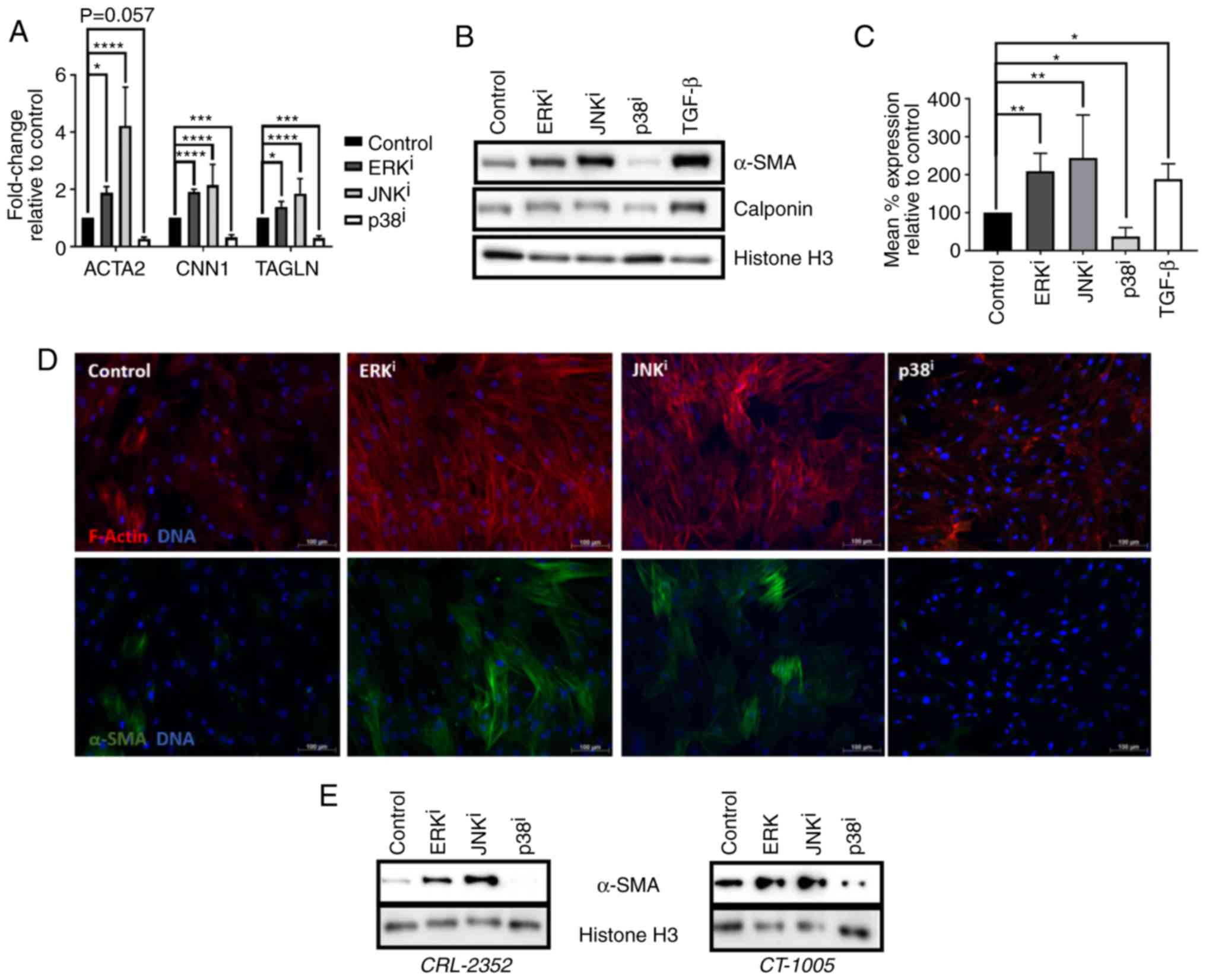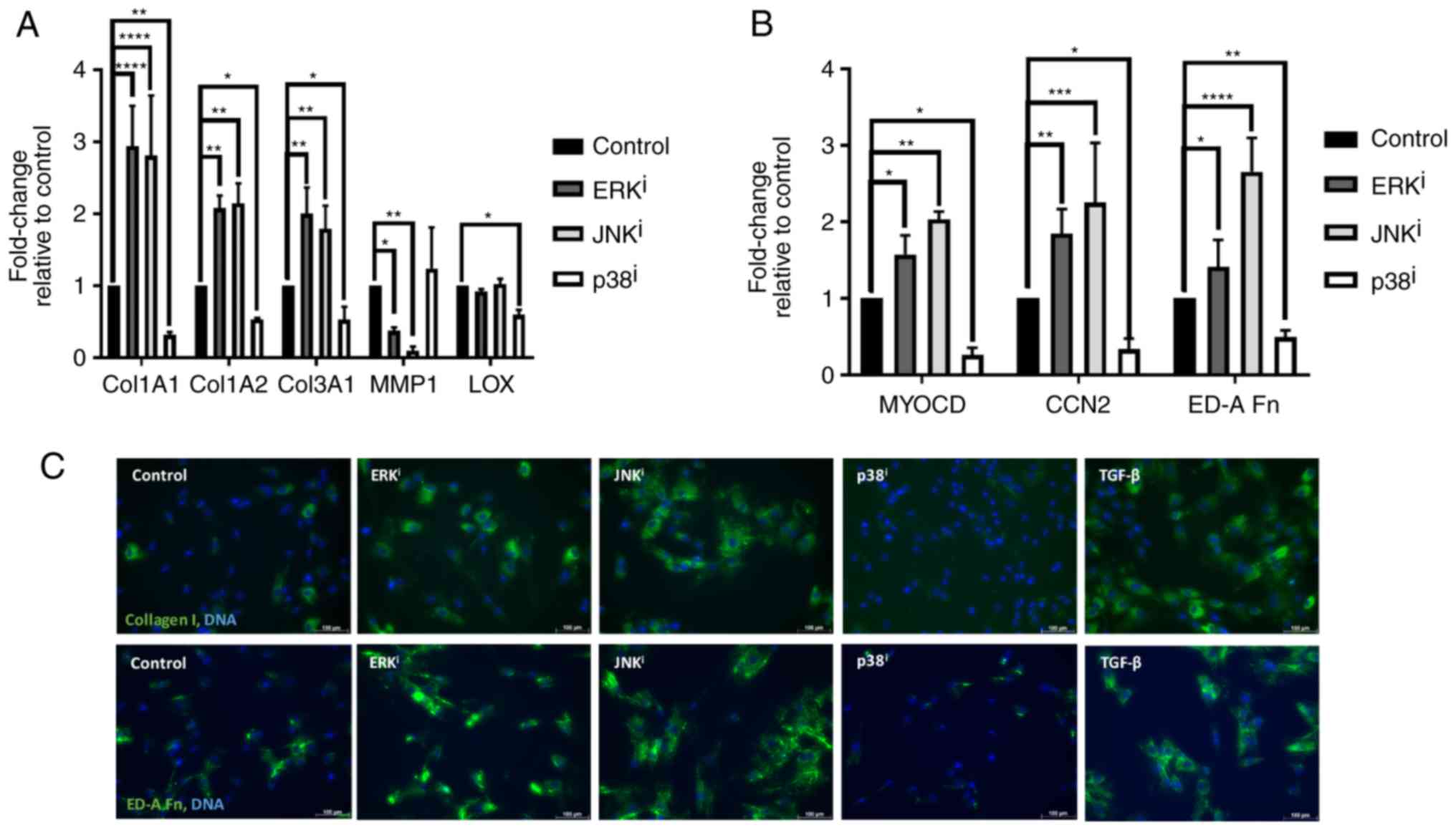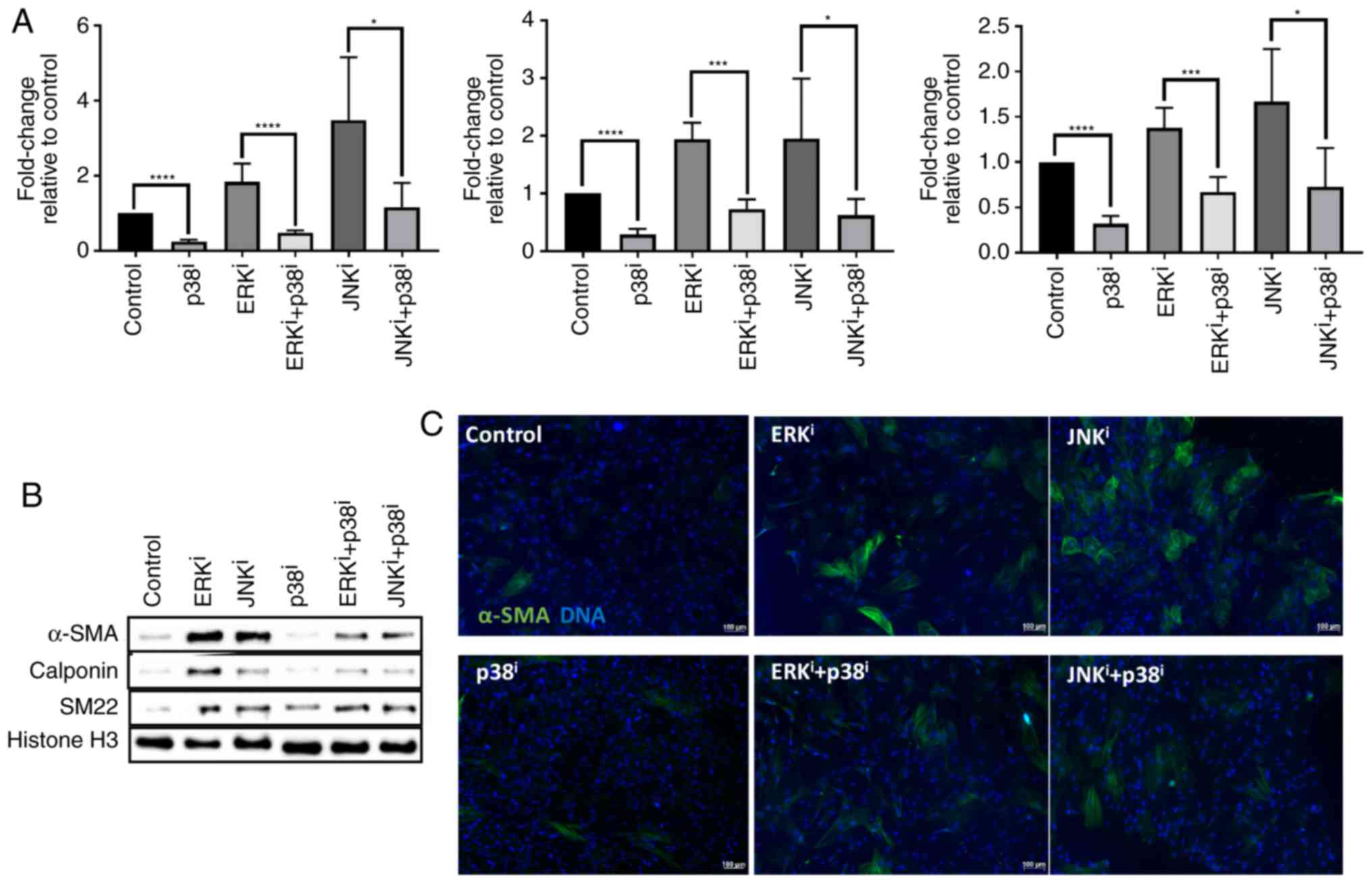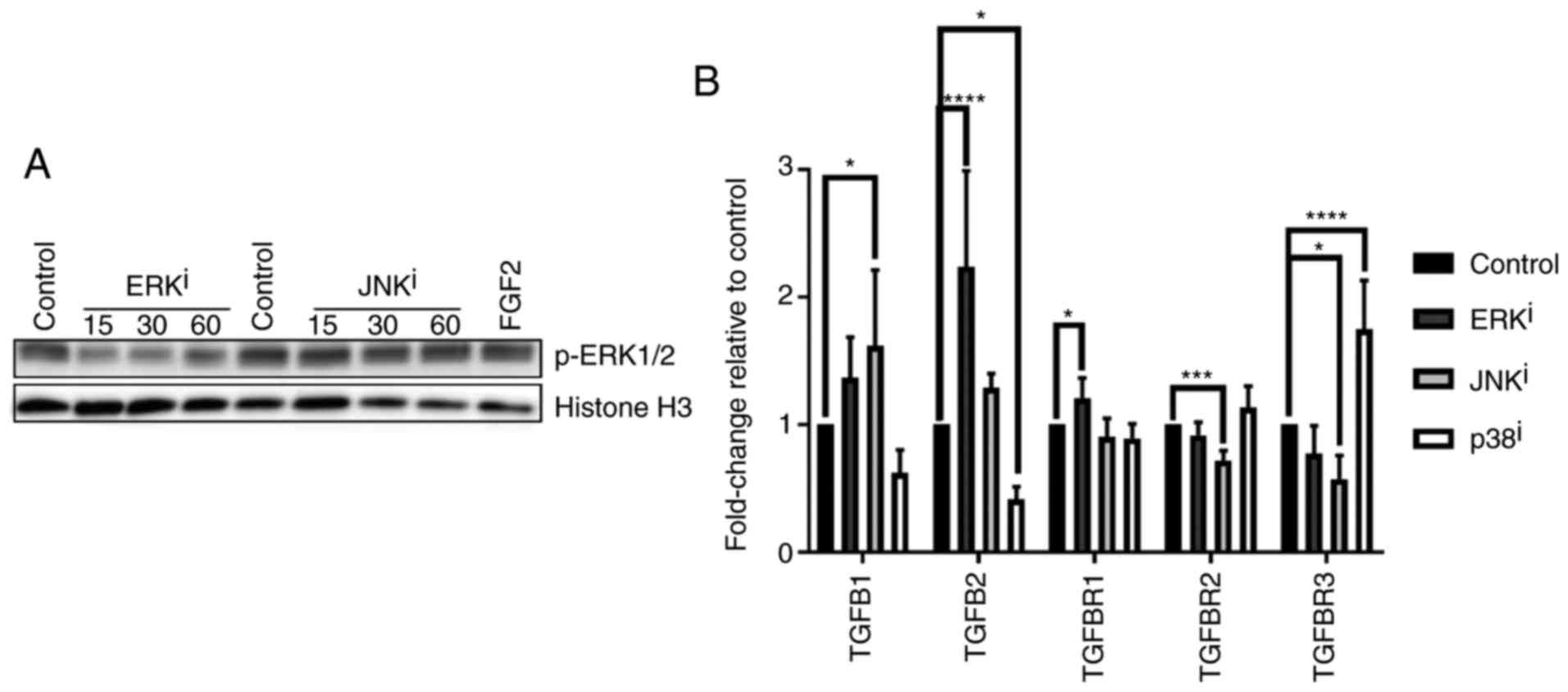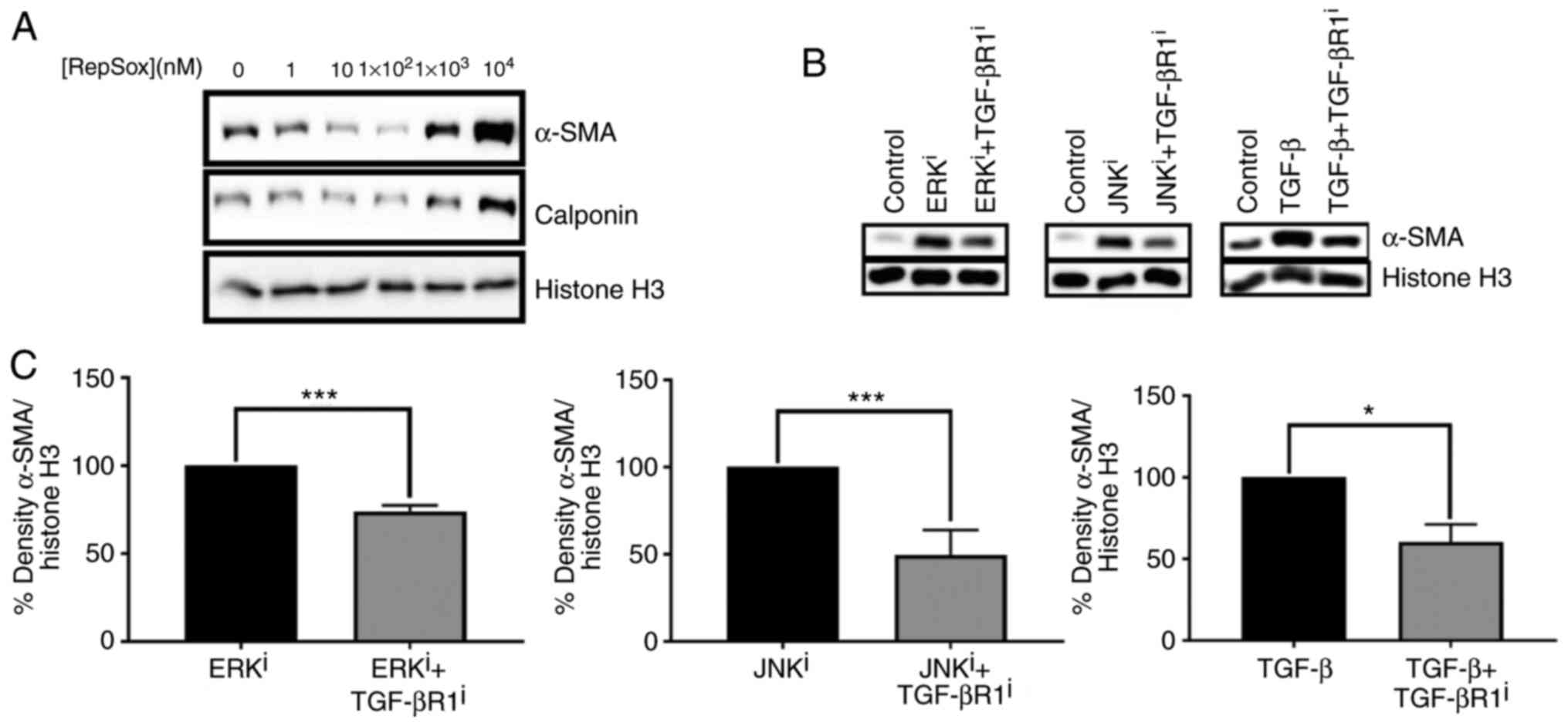|
1
|
Wynn TA: Common and unique mechanisms
regulate fibrosis in various fibroproliferative diseases. J Clin
Invest. 117:524–529. 2007. View
Article : Google Scholar : PubMed/NCBI
|
|
2
|
Zeisberg M and Kalluri R: Cellular
mechanisms of tissue fibrosis. 1. Common and organ-specific
mechanisms associated with tissue fibrosis. Am J Physiol Cell
Physiol. 304:C216–C225. 2013. View Article : Google Scholar :
|
|
3
|
Hinz B: Myofibroblasts. Exp Eye Res.
142:56–70. 2016. View Article : Google Scholar
|
|
4
|
Cargnello M and Roux PP: Activation and
function of the MAPKs and their substrates, the MAPK-activated
protein kinases. Microbiol Mol Biol Rev. 75:50–83. 2011. View Article : Google Scholar : PubMed/NCBI
|
|
5
|
Mulsow JJ, Watson RW, Fitzpatrick JM and
O’connell PR: Transforming growth factor-beta promotes pro-fibrotic
behavior by serosal fibroblasts via PKC and ERK1/2 mitogen
activated protein kinase cell signaling. Ann Surg. 242:880–889.
2005. View Article : Google Scholar : PubMed/NCBI
|
|
6
|
Stambe C, Atkins RC, Tesch GH, Masaki T,
Schreiner GF and Nikolic-Paterson DJ: The role of p38α
mitogen-activated protein kinase activation in renal fibrosis. J Am
Soc Nephrol. 15:370–379. 2004. View Article : Google Scholar : PubMed/NCBI
|
|
7
|
Grella A, Kole D, Holmes W and Dominko T:
FGF2 overrides TGFβ1-driven integrin ITGA11 expression in human
dermal fibroblasts. J Cell Biochem. 117:1000–1008. 2016. View Article : Google Scholar
|
|
8
|
Wu W, Muchir A, Shan J, Bonne G and Worman
HJ: Mitogen-activated protein kinase inhibitors improve heart
function and prevent fibrosis in cardiomyopathy caused by mutation
in lamin A/C gene. Circulation. 123:53–61. 2011. View Article : Google Scholar
|
|
9
|
Li J, Campanale NV, Liang RJ, Deane JA,
Bertram JF and Ricardo SD: Inhibition of p38 mitogen-activated
protein kinase and transforming growth factor-β1/Smad signaling
pathways modulates the development of fibrosis in
adriamycin-induced nephropathy. Am J Pathol. 169:1527–1540. 2006.
View Article : Google Scholar : PubMed/NCBI
|
|
10
|
See F, Thomas W, Way K, Tzanidis A, Kompa
A, Lewis D, Itescu S and Krum H: p38 mitogen-activated protein
kinase inhibition improves cardiac function and attenuates left
ventricular remodeling following myocardial infarction in the rat.
J Am Coll Cardiol. 44:1679–1689. 2004. View Article : Google Scholar : PubMed/NCBI
|
|
11
|
Molkentin JD, Bugg D, Ghearing N, Dorn LE,
Kim P, Sargent MA, Gunaje J, Otsu K and Davis J:
Fibroblast-specific genetic manipulation of p38 Mitogen-activated
protein kinase in vivo reveals its central regulatory role in
fibrosis. Circulation. 136:549–561. 2017. View Article : Google Scholar : PubMed/NCBI
|
|
12
|
Furukawa F, Matsuzaki K, Mori S, Tahashi
Y, Yoshida K, Sugano Y, Yamagata H, Matsushita M, Seki T, Inagaki
Y, et al: p38 MAPK mediates fibrogenic signal through Smad3
phosphorylation in rat myofibroblasts. Hepatology. 38:879–889.
2003. View Article : Google Scholar : PubMed/NCBI
|
|
13
|
Meyer-Ter-Vehn T, Gebhardt S, Sebald W,
Buttmann M, Grehn F, Schlunck G and Knaus P: p38 inhibitors prevent
TGF-beta-induced myofibroblast transdifferentiation in human Tenon
fibroblasts. Invest Ophthalmol Vis Sci. 47:1500–1509. 2006.
View Article : Google Scholar : PubMed/NCBI
|
|
14
|
Sousa AM, Liu T, Guevara O, Stevens J,
Fanburg BL, Gaestel M, Toksoz D and Kayyali US: Smooth muscle
alpha-actin expression and myofibroblast differentiation by TGFbeta
are dependent upon MK2. J Cell Biochem. 100:1581–1592. 2007.
View Article : Google Scholar
|
|
15
|
Dolivo DM, Larson SA and Dominko T:
FGF2-mediated attenuation of myofibroblast activation is modulated
by distinct MAPK signaling pathways in human dermal fibroblasts. J
Dermatol Sci. 88:339–348. 2017. View Article : Google Scholar : PubMed/NCBI
|
|
16
|
Schmittgen TD and Livak KJ: Analyzing
real-time PCR data by the comparative CT method. Nat Protoc.
3:1101–1108. 2008. View Article : Google Scholar
|
|
17
|
Kagan HM and Li W: Lysyl oxidase:
Properties, specificity, and biological roles inside and outside of
the cell. J Cell Biochem. 88:660–672. 2003. View Article : Google Scholar : PubMed/NCBI
|
|
18
|
Burch ML, Zheng W and Little PJ: Smad
linker region phosphorylation in the regulation of extracellular
matrix synthesis. Cell Mol Life Sci. 68:97–107. 2011. View Article : Google Scholar
|
|
19
|
Bain J, Plater L, Elliott M, Shpiro N,
Hastie CJ, Mclauchlan H, Klevernic I, Arthur JS, Alessi DR and
Cohen P: The selectivity of protein kinase inhibitors: A further
update. Biochem J. 408:297–315. 2007. View Article : Google Scholar : PubMed/NCBI
|
|
20
|
Maddaluno L, Urwyler C and Werner S:
Fibroblast growth factors: Key players in regeneration and tissue
repair. Development. 144:4047–4060. 2017. View Article : Google Scholar : PubMed/NCBI
|
|
21
|
Johnson KE and Wilgus TA: Vascular
endothelial growth factor and angiogenesis in the regulation of
cutaneous wound repair. Adv Wound Care (New Rochelle). 3:647–661.
2014. View Article : Google Scholar :
|
|
22
|
Barrientos S, Stojadinovic O, Golinko MS,
Brem H and Tomic-Canic M: Growth factors and cytokines in wound
healing. Wound Repair Regen. 16:585–601. 2008. View Article : Google Scholar
|
|
23
|
Werner S and Grose R: Regulation of wound
healing by growth factors and cytokines. Physiol Rev. 83:835–870.
2003. View Article : Google Scholar : PubMed/NCBI
|
|
24
|
Krishna M and Narang H: The complexity of
mitogen-activated protein kinases (MAPKs) made simple. Cell Mol
Life Sci. 65:3525–3544. 2008. View Article : Google Scholar : PubMed/NCBI
|
|
25
|
Plotnikov A, Zehorai E, Procaccia S and
Seger R: The MAPK cascades: Signaling components, nuclear roles and
mechanisms of nuclear translocation. Biochim Biophys Acta.
1813.1619–1633. 2011.
|
|
26
|
Ihn H, Yamane K and Tamaki K: Increased
phosphorylation and activation of mitogen-activated protein kinase
p38 in scleroderma fibroblasts. J Invest Dermatol. 20:247–255.
2005. View Article : Google Scholar
|
|
27
|
Galliher AJ and Schiemann WP: Src
phosphorylates Tyr284 in TGF-beta type II receptor and regulates
TGF-beta stimulation of p38 MAPK during breast cancer cell
proliferation and invasion. Cancer Res. 67:3752–3758. 2007.
View Article : Google Scholar : PubMed/NCBI
|
|
28
|
Lee MK, Pardoux C, Hall MC, Lee PS,
Warburton D, Qing J, Smith SM and Derynck R: TGF-beta activates Erk
MAP kinase signalling through direct phosphorylation of ShcA. EMBO
J. 26:3957–3967. 2007. View Article : Google Scholar : PubMed/NCBI
|
|
29
|
Chapnick DA, Warner L, Bernet J, Rao T and
Liu X: Partners in crime: The TGFβ and MAPK pathways in cancer
progression. Cell Biosci. 1:422011. View Article : Google Scholar
|
|
30
|
Xie L, Law BK, Chytil AM, Brown KA, Aakre
ME and Moses HL: Activation of the Erk pathway is required for
TGF-beta1-induced EMT in vitro. Neoplasia. 6:603–610. 2004.
View Article : Google Scholar : PubMed/NCBI
|
|
31
|
Gui T, Sun Y, Shimokado A and Muragaki Y:
The roles of mitogen-activated protein kinase pathways in
TGF-β-induced epithelial-mesenchymal transition. J Signal
Transduct. 2012.289243:2012.
|
|
32
|
Selvamurugan N, Kwok S, Alliston T, Reiss
M and Partridge NC: Transforming growth factor-beta1 regulation of
collagenase-3 expression in osteoblastic cells by cross-talk
between the Smad and MAPK signaling pathways and their components,
Smad2 and Runx2. J Biol Chem. 279:19327–19334. 2004. View Article : Google Scholar : PubMed/NCBI
|
|
33
|
Terai K, Call MK, Liu H, Saika S, Liu CY,
Hayashi Y, Chikama T, Zhang J, Terai N, Kao CW and Kao WW:
Crosstalk between TGF-beta and MAPK signaling during corneal wound
healing. Invest Ophthalmol Vis Sci. 52:8208–8215. 2011. View Article : Google Scholar : PubMed/NCBI
|
|
34
|
Xiao YQ, Malcolm K, Worthen GS, Gardai S,
Schiemann WP, Fadok VA, Bratton DL and Henson PM: Cross-talk
between ERK and p38 MAPK mediates selective suppression of
pro-inflammatory cytokines by transforming growth factor-β. J Biol
Chem. 277:14884–14893. 2002. View Article : Google Scholar : PubMed/NCBI
|
|
35
|
Kolosova I, Nethery D and Kern JA: Role of
Smad2/3 and p38 MAP kinase in TGF-β1-induced epithelial-mesenchymal
transition of pulmonary epithelial cells. J Cell Physiol.
226:1248–1254. 2011. View Article : Google Scholar :
|
|
36
|
Nishida M, Okumura Y, Sato H and Hamaoka
K: Delayed inhibition of p38 mitogen-activated protein kinase
ameliorates renal fibrosis in obstructive nephropathy. Nephrol Dial
Transplant. 23:2520–2524. 2008. View Article : Google Scholar : PubMed/NCBI
|
|
37
|
Raia V, Maiuri L, Ciacci C, Ricciardelli
I, Vacca L, Auricchio S, Cimmino M, Cavaliere M, Nardone M, Cesaro
A, et al: Inhibition of p38 mitogen activated protein kinase
controls airway inflammation in cystic fibrosis. Thorax.
60:773–780. 2005. View Article : Google Scholar : PubMed/NCBI
|
|
38
|
Gao F, Wang Y, Li S, Wang Z, Liu C and Sun
D: Inhibition of p38 mitogen-activated protein kinases attenuates
renal interstitial fibrosis in a murine unilateral ureteral
occlusion model. Life Sci. 167:78–84. 2016. View Article : Google Scholar : PubMed/NCBI
|
|
39
|
Sugiyama N, Kohno M and Yokoyama T:
Inhibition of the p38 MAPK pathway ameliorates renal fibrosis in an
NPHP2 mouse model. Nephrol Dial Transplant. 27:1351–1358. 2012.
View Article : Google Scholar
|
|
40
|
Wilde JM, Gumucio JP, Grekin JA, Sarver
DC, Noah AC, Ruehlmann DG, Davis ME, Bedi A and Mendias CL:
Inhibition of p38 mitogen-activated protein kinase signaling
reduces fibrosis and lipid accumulation after rotator cuff repair.
J Shoulder Elbow Surg. 25:1501–1518. 2016. View Article : Google Scholar : PubMed/NCBI
|
|
41
|
López-Casillas F, Payne HM, Andres JL and
Massagué J: Betaglycan can act as a dual modulator of TGF-beta
access to signaling receptors: Mapping of ligand binding and GAG
attachment sites. J Cell Biol. 124:557–568. 1994. View Article : Google Scholar : PubMed/NCBI
|
|
42
|
Eickelberg O, Centrella M, Reiss M,
Kashgarian M and Wells RG: Betaglycan Inhibits TGF-beta signaling
by preventing type I-type II receptor complex formation.
Glycosaminoglycan modifications alter betaglycan function. J Biol
Chem. 277:823–829. 2002. View Article : Google Scholar
|
|
43
|
Hermida N, López B, González A, Dotor J,
Lasarte JJ, Sarobe P, Borrás-Cuesta F and Díez J: A synthetic
peptide from transforming growth factor-beta1 type III receptor
prevents myocardial fibrosis in spontaneously hypertensive rats.
Cardiovasc Res. 81:601–609. 2009. View Article : Google Scholar
|
|
44
|
Ezquerro IJ, Lasarte JJ, Dotor J,
Castilla-Cortazar I, Bustos M, Peñuelas I, Blanco G, Rodríguez C,
Lechuga Mdel C, Greenwel P, et al: A synthetic peptide from
transforming growth factor beta type III receptor inhibits liver
fibrogenesis in rats with carbon tetrachloride liver injury.
Cytokine. 22:12–20. 2003. View Article : Google Scholar : PubMed/NCBI
|
|
45
|
Santiago B, Gutierrez-Cañas I, Dotor J,
Palao G, Lasarte JJ, Ruiz J, Prieto J, Borrás-Cuesta F and Pablos
JL: Topical application of a peptide inhibitor of transforming
growth factor-beta1 ameliorates bleomycin-induced skin fibrosis. J
Invest Dermatol. 125:450–455. 2005. View Article : Google Scholar : PubMed/NCBI
|
|
46
|
Ahn JY, Park S, Yun YS and Song JY:
Inhibition of type III TGF-β receptor aggravates lung fibrotic
process. Biomed Pharmacother. 64:472–476. 2010. View Article : Google Scholar : PubMed/NCBI
|
|
47
|
Lin Y, Zhang B, Liang H, Lu Y, Ai X, Zhang
B and Chen X: JNK inhibitor SP600125 enhances TGF-β-induced
apoptosis of RBE human cholangiocarcinoma cells in a Smad-dependent
manner. Mol Med Rep. 8:1623–1629. 2013. View Article : Google Scholar : PubMed/NCBI
|
|
48
|
Wu S, Kasisomayajula K, Peng J and
Bancalari E: Inhibition of JNK enhances TGF-beta1-activated Smad2
signaling in mouse embryonic lung. Pediatr Res. 65:381–386. 2009.
View Article : Google Scholar : PubMed/NCBI
|
|
49
|
Turner N and Grose R: Fibroblast growth
factor signalling: From development to cancer. Nat Rev Cancer.
10:116–129. 2010. View Article : Google Scholar : PubMed/NCBI
|
|
50
|
Hough C, Radu M and Doré JJ: Tgf-beta
induced Erk phosphorylation of smad linker region regulates smad
signaling. PLoS One. 7:e425132012. View Article : Google Scholar : PubMed/NCBI
|
|
51
|
Hayashida T, Decaestecker M and Schnaper
HW: Cross-talk between ERK MAP kinase and Smad signaling pathways
enhances TGF-beta-dependent responses in human mesangial cells.
FASEB J. 17:1576–1578. 2003. View Article : Google Scholar : PubMed/NCBI
|
|
52
|
Engel ME, McDonnell MA, Law BK and Moses
HL: Interdependent SMAD and JNK signaling in transforming growth
factor-beta-mediated transcription. J Biol Chem. 274:37413–37420.
1999. View Article : Google Scholar : PubMed/NCBI
|
|
53
|
Mori S, Matsuzaki K, Yoshida K, Furukawa
F, Tahashi Y, Yamagata H, Sekimoto G, Seki T, Matsui H, Nishizawa
M, et al: TGF-beta and HGF transmit the signals through
JNK-dependent Smad2/3 phosphorylation at the linker regions.
Oncogene. 23:7416–7429. 2004. View Article : Google Scholar : PubMed/NCBI
|
|
54
|
Qu K, Huang Z, Lin T, Liu S, Chang H, Yan
Z, Zhang H and Liu C: New Insight into the anti-liver fibrosis
effect of multi-targeted tyrosine kinase inhibitors: From molecular
target to clinical trials. Front Pharmacol. 6:3002016. View Article : Google Scholar
|
|
55
|
Kompa AR: Do p38 mitogen-activated protein
kinase inhibitors have a future for the treatment of cardiovascular
disease. J Thorac Dis. 8:E1068–E1071. 2016. View Article : Google Scholar
|
|
56
|
Raghu G and Selman M: Nintedanib and
pirfenidone. New antifibrotic treatments indicated for idiopathic
pulmonary fibrosis offer hopes and raises questions. Am Thoracic
Soc. 191:252–254. 2015.
|
|
57
|
Hartmann JT, Haap M, Kopp HG and Lipp HP:
Tyrosine kinase inhibitors-a review on pharmacology, metabolism and
side effects. Curr Drug Metab. 10:470–481. 2009. View Article : Google Scholar : PubMed/NCBI
|















